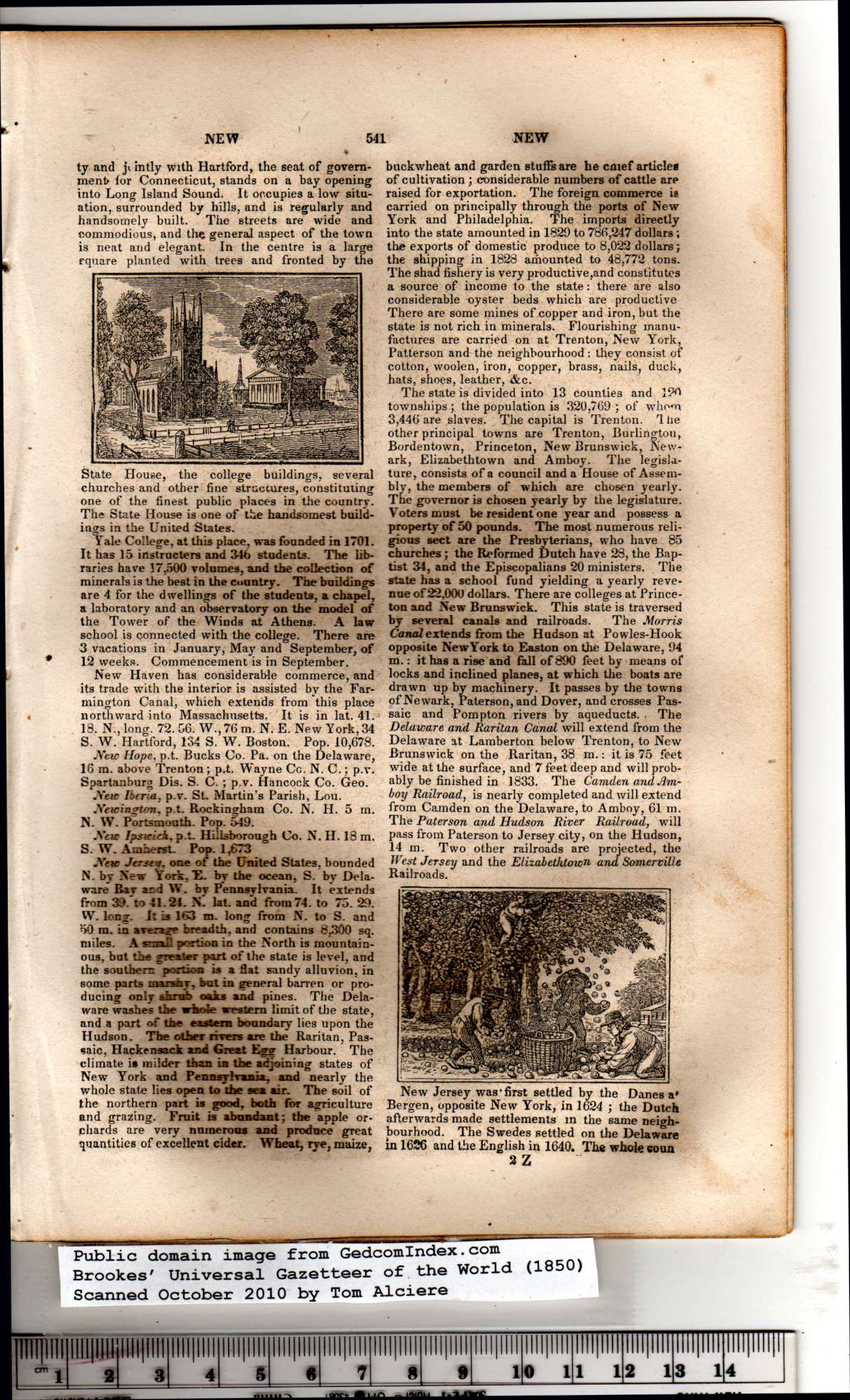|
ty and j intly with Hartford, the seat of govern-
ment* lor Connecticut, stands on a bay opening
into Long Island Sound. It occupies a low situ-
ation, surrounded by hills, and is regularly and
handsomely built. The streets are wide and
commodious, and the general aspect of the town
is neat and elegant. In the centre is a large
rquare planted with trees and fronted by the
State House, the college buildings, several
churches and other fine structures, constituting
one of the finest public places in the country.
The State House is one of the handsomest build-
ings in the United States.
Yale College, at this place, was founded in 1701.
It has 15 insfrncters and 346 students. The lib-
raries have 17,500 volumes, and the collection of
minerals is the best in the e< inn try. Tne buildings
are 4 for the dwellings of the students, a chapel,
a laboratory and an observatory on the model of
the Tower of the Winds at Athens. A law
school is connected with the college. There are
3 vacations in January, May and September, of
12 weeks. Commencement is in September.
New Haven has considerable commerce, and
its trade with the interior is assisted by the Far-
mington Canal, which extends from this place
northward into Massachusetts. It is in lat. 41.
18. N., long. 72. 56. W., 76 m. N. E. New York, 34
S. W. Hartford, 134 S. W. Boston. Pop. 10,678.
.Yew Hope. ph. Bucks Co. Pa. on the Delaware,
16 m. above Trenton; ph. Wayne Cc. N. C.; p.v.
Spartanburg Dis. S. C. ; p.v. Hancock Co. Geo.
.Veic Iberia, p.v. St. Martin’s Parish, Lou.
A'twingtcm. ph. Rockingham Co. N. H. 5 m.
N. W. Portsmouth. Pop. 549.
.Veic Ipswich, p.t. Hillsborough Co. N. H. 18 m.
S. W. Amherst. Pop. 1,673
.Vfie Jersey, one of the United States, bounded
N. by New York. E. by the ocean, S. bv Dela-
ware Bay ar.I W. by Pennsylvania. It extends
from 39. i? 41.24. N. lat. and from 74. to 75. 29.
Wr. long. It is 163 m. long from N. to S. and
50 m. in average breadth, and contains 6.300 sq.
miles. A small portion in the North is mountain-
ous, but the greater part of the state is level, and
the southern portion is a flat sandy alluvion, in
some parts marshy, but in general barren or pro-
ducing only shrub oaks and pines. The Dela-
ware washes the whole western limit of the state,
and a part of the eastern boundary lies upon the
Hudson. The other rivers are the Raritan, Pas-
saic, Hackensack and Great Egg Harbour. The
climate is milder than in the adjoining states of
New York and Pennsylvania, and nearly the
whole state lies open to the sea air. The soil of
the northern part is good, both for agriculture
and grazing. Fruit is abundant; the apple or-
chards are very numerous and produce great
quantities of excellent cider. Wheat, rye, maize,
buckwheat and garden stuffs are he cmef articles
of cultivation ; considerable numbers of cattle are
raised for exportation. The foreign commerce is
carried on principally through the ports of New
York and Philadelphia. The imports directly
into the state amounted in 1829 to 786,247 dollars;
the exports of domestic produce to 8,022 dollars;
the shipping in 1828 amounted to 48,772 tons.
The shad fishery is very productive,and constitutes
a source of income to the state: there are also
considerable oyster beds which are productive
There are some mines of copper and iron, but the
state is not rich in minerals. Flourishing manu-
factures are carried on at Trenton, New York,
Patterson and the neighbourhood: they consist of
cotton, woolen, iron, copper, brass, nails, duck,
hats, shoes, leather, &c. |
The state is divided into 13 counties and 12*1
townships ; the population is 320,769 ; of whom
3,446 are slaves. The capital is Trenton. 'I lie
other principal towns are Trenton, Burlington,
Bordentown, Princeton, New Brunswick, New-
ark, Elizabethtown and Amboy. The legisla-
ture, consists of a council and a House of Assem-
bly, the members of which are chosen yearly.
The governor is chosen yearly by the legislature.
Voters must be resident one year and possess a
property of 50 pounds. The most numerous reli-
gious sect are the Presbyterians, who have 85
churches; the Reformed Dutch have 28, the Bap-
tist 34, and the Episcopalians 20 ministers. The
state has a school fund yielding a yearly reve-
nue of22.000 dollars. There are colleges at Prince-
ton and New Brunswick. This state is traversed
by several canals and railroads. The Morris
Canal extends from the Hudson at Powles-Hook
opposite NewY'ork to Easton on the Delaware, 94
m.: it has a rise and fall of 890 feet by means of
locks and inclined planes, at which the boats are
drawn up by machinery. It passes by the towns
of Newark, Paterson, and Dover, and crosses Pas-
saic and Pompton rivers by aqueducts. , The
Delaware and Raritan Canal will extend from the
Delaware at Lamberton below Trenton, to New
Brunswick on the Raritan, 38 m.: it is 75 feet
wide at the surface, and 7 feet deep and will prob-
ably be finished in 1833. The Camden and Am-
boy Railroad, is nearly completed and will extend
from Camden on the Delaware, to Amboy, 61 m.
The Paterson and Hudson River Railroad, will
pass from Paterson to Jersey city, on the Hudson,
14 m. Two other railroads are projected, the
West Jersey and the Elizabethtown and Somerville
Railroads.
New Jersey wasxe2x80x98first settled by the Danes axc2xbb
Bergen, opposite New York, in 1624 ; the Dutch
afterwards made settlements in the same neigh-
bourhood. The Swedes settled on the Delaware
in 1626 and the English in 1640. The whole coun
3 Z |
